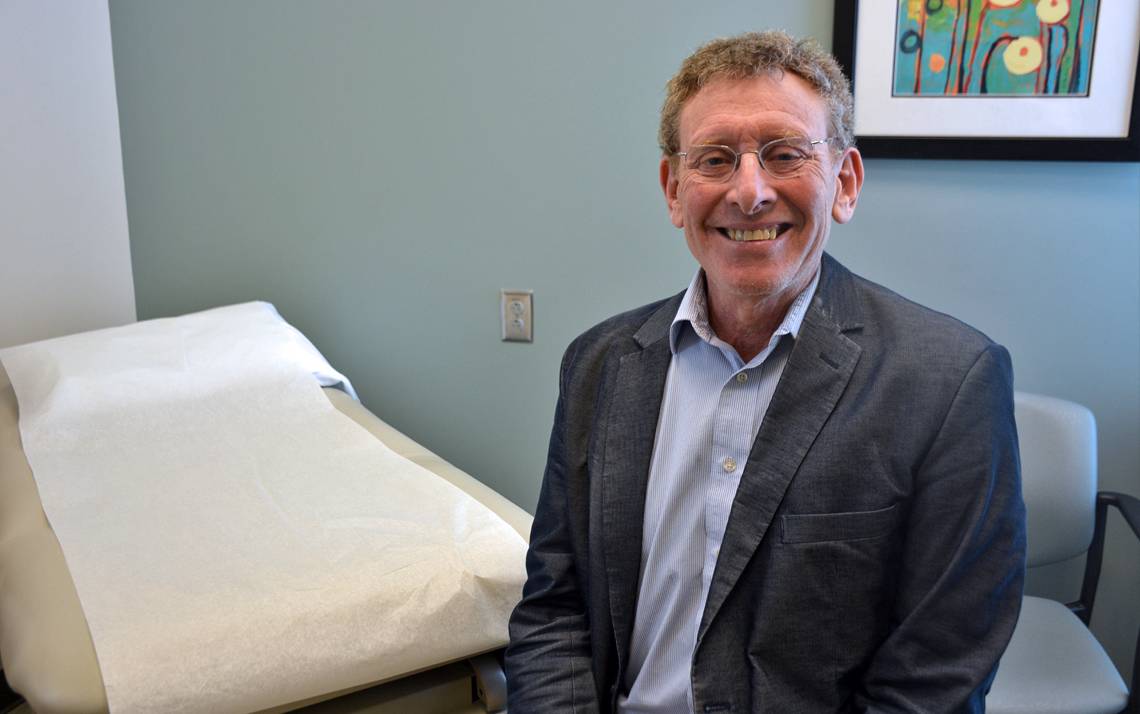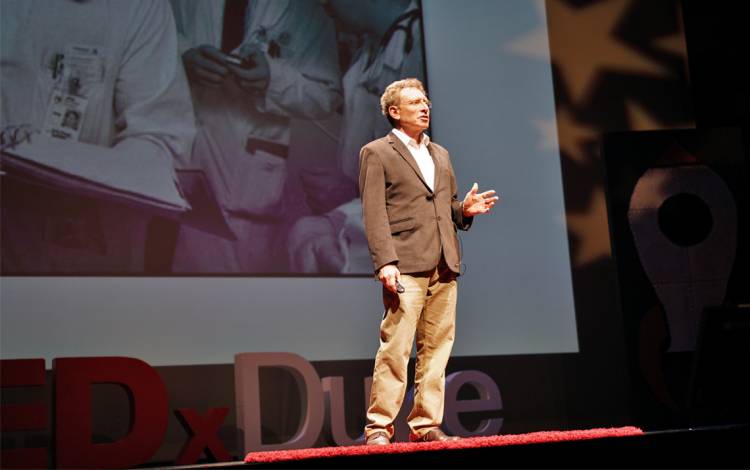Blue Devil of the Week: Showing Empathy through Communication
Dermatologist Neil Prose shares his passion for patient communication

Name: Neil Prose
Title: Professor of Dermatology and Pediatrics and Research Professor for the Duke Global Health Institute
Years at Duke: 30
What he does: Neil Prose begins his seminars to the Duke community with a hypothetical question.
“Imagine sitting on opposite sides of the table from the patient with the problem in the middle,” he said. “What would it take to get on the same side of the table looking at the problem together?”
Prose teaches the importance of communication skills to employees and students in the Duke University School of Medicine and Duke Global Health Institute. It’s important that doctors ask patients open-ended question about how they’re feeling and reflect back to the patient what they heard, he said.
“You must show you’re listening,” Prose said. “The average doctor interrupts within the first 17 seconds of a medical interview. You need to understand a patient’s family history, culture and beliefs to accurately understand their health.”
Prose practices this when he treats patients at Duke Pediatric Dermatology in Patterson Place, off U.S. 15-501. Prose treats children with both rare and common skin disorders, including eczema, warts, acne and vitiligo, a long-term skin condition characterized by patches of skin losing their pigment and becoming white.
There’s often an emotional component to the work Prose does. His patients discuss with him the negative associations they have with their appearance because of the conditions. He takes time to speak to each patient to understand how their health affects their mental state.
“There’s a big emotional component of suffering from skin diseases because of social norms about one’s appearance,” he said. “In dermatology, like everything else, there’s a need to use empathy and create a human connection.”
What he loves about Duke: Prose serves as co-director of Duke’s Health Humanities Lab, which coordinates work in the humanities, social sciences and medicine to understand the health of populations locally and worldwide.
He loves the interdisciplinary approach to lab projects like the “Chronic Health Conditions Storytelling Group,” where Duke students share how chronic health conditions changed their lives, and “Narrative Medicine Mondays,” a lunch group that engages in creative writing about different health themes.
“The Health Humanities Lab is a place where doctors and social scientists and teachers come together,” Prose said. “Duke is a place where one can enthusiastically explore numerous remarkable ways of seeing and understanding the world.”
 Memorable day at work: Prose delivered a TEDxDuke talk in 2018 entitled “Singing the Same Song; Empathy, Curiosity and Human Connection.” He spoke about the importance of listening and empathizing with patients to a full Reynolds Theater.
Memorable day at work: Prose delivered a TEDxDuke talk in 2018 entitled “Singing the Same Song; Empathy, Curiosity and Human Connection.” He spoke about the importance of listening and empathizing with patients to a full Reynolds Theater.
“It was great fun,” Prose said. “It was a real learning experience to figure out how to share what I believe in and teach in 12 minutes.”
Best advice received: About 20 years ago, Dr. Frank Neelon, associate professor emeritus of medicine at Duke, told Prose about an article on curiosity in medicine that included a quote from Faith Thayer Fitzgerald, a doctor for the University of California, Davis Health.
“Curiosity transforms strangers into people we can empathize with.”
Prose credits that quote to sparking his passion for communication.
“For the first time, I came to see the ways in which curiosity could enrich my work as a physician and teaching about curiosity could be helpful to my young students,” he said.
First ever job: Prose shaved rabbits in a research lab for Merck, a drug company, while in high school.
“It was a miserable experience for me and the rabbits,” he said. “It was the origin of a lifelong allergy to rabbit hair.”
Something most people don’t know about him: Prose facilitates workshops in laughter yoga. The practice originated in India and teaches people to laugh for no reason. The idea is that the laughter that occurs in these workshops has the same health and relaxation benefits as laughing at a joke or a funny situation.
He learned about laughter yoga through the documentary “The Laughing Club of India.” Prose shares the practice with students and co-workers and uses it himself.
“If I’m just waiting at a traffic light, I’ll do it,” he said. “It’s very therapeutic and relaxing.”
Is there a colleague at Duke who has an intriguing job or goes above and beyond to make a difference? Nominate that person for Blue Devil of the Week.